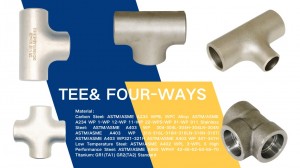
Introduction to Pipe Tee (Tee Fitting)
A Tee (or Tee Fitting) is a type of pipe fitting used to combine or split fluid flow in piping systems. It has a T-shaped design with three openings—one inlet and two outlets (or vice versa).
Tees are widely used in plumbing, oil & gas, chemical processing, and water supply systems.
Types of Tees
- Straight Tee (Equal Tee)
- All three openings are of the same size (e.g., 18″×18″×18″).
- Used for equal flow distribution.
- Reducing Tee
- One branch is smaller than the main pipe (e.g., 18″×18″×12″).
- Used to connect smaller pipelines to a main line.
- Barred Tee
- Has a bar or restriction to prevent pigging tools from entering the branch.
- Used in pipeline cleaning (pigging) systems.
- Lateral Tee (45° Branch)
- The branch exits at a 45° angle instead of 90°.
- Reduces pressure drop and turbulence.
Material & Standards
- Common Materials: Carbon Steel (A234 WPB), Stainless Steel (A403 WP316), Alloy Steel.
- Standards:
- ASME B16.9 (Factory-made butt-welding fittings)
- ASME B16.5 (Flanged tees)
- API 5L (Pipeline tees for oil & gas)
Key Applications
✔ Flow Diversion – Splitting or combining fluid streams.
✔ Branch Connections – Adding a secondary pipeline.
✔ Pressure Systems – Used in high-pressure oil, gas, and chemical plants.
✔ Piping Modifications – Allows future expansion in pipelines.
Selection Considerations
- Size & Pressure Rating (e.g., 18″ 600lb)
- Material Compatibility (Corrosion resistance)
- End Connections (Butt-weld, Socket Weld, Threaded, Flanged)
- Special Requirements (Fire-safe, Anti-corrosion coating, NACE MR0175 for sour service)
Tees are essential for complex piping networks, ensuring efficient flow control and system flexibility.
Mila
Post time: May-07-2025
